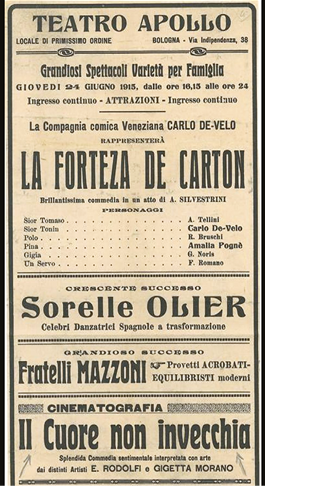Bologna’s Via dell’Indipendenza, opened in the 1880s to connect the city center to the train station, is the city’s “theater street,” with numerous sites offering shows, their signs lighting up the sides of the streets and the porticos. Among these is the most recent of all the Bolognese theaters whose history we are gradually describing: the Apollo Theater. It opened in 1912, when cavalry major Sebastiano Poggi decided to build a “condominial” theater in the space left after the demolition of a few hovels on via dell’Orso.
At first, he wasn’t granted permission because the site wasn’t sufficiently isolated as required by law. But he didn’t give up, and instead asked to open a simple movie theater, later converted into a cinema-theater, and on 4 October 1913 he finally received permission for live performances.
At that point, he modified the building’s structure, opened the entrance at Via dell’Indipendenza 38, and, on 10 October 1914, inaugurated a large hall decorated in eclectic style with balconies and a large parterre. The local newspaper “Il Resto del Carlino” described it as follows: “From a spacious and luminous foyer, one walks through wide vestibules and corridors to the large and well-proportioned main room, with good ventilation and darkened by a double series of side windows. A single mid-air balcony runs the entire length, extending more spaciously on the side facing the small stage, to be used to present variety and Café chantant shows as well as movies.”
Due to a tax law that gave cinema-varieties preference over theaters, in 1915 the Galli-Grazia Theatrical Agency, which managed the theater, decided to eliminate screenings and instead promote “a variety show that can offer the general public a way to enjoy this type of art, which is normally limited to the “Café chantants” and therefore distrusted by chastity and morality.” But this created problems, because the Bologna Orchestra Company accused the agency of using non-professional musicians and causing harm to the category.

Due to its location, the Apollo was extremely popular, and audiences enjoyed a succession of variety shows, Café chantant, operettas, reviews, movie screenings, and (more rarely), operas. For example, on a single evening of October of 1918, performers included the irresistible comedian Castagna with Emmy de Mari, Lina Castillo and the Bianchi Sisters, the Venice Trio, the Kinomodo Troupe, Giobet the cyclist, and Zonaide. In the ‘20s it became part of Società Anonima Pittaluga’s national cinema-variety circuit, and presented “stars” such as Dina Evarist on the same evening as the “parodists of the Pinocchio Trio and the acclaimed Russian singer Irina Krasinska,” back in Bologna after many years, and Lydia Johnson (a.k.a. Lydia Abramovic, a Russian actress who fled after the October Revolution). In the ‘30s, the new management complied with public taste and converted the space into a movie theater. The building was completely destroyed during the massive Allied bombing of 25 September 1943.
In 1950, the Metropolitan Cinema opened on the site of the Apollo, but the Metropolitan has now closed as well, replaced by a store.




.png)